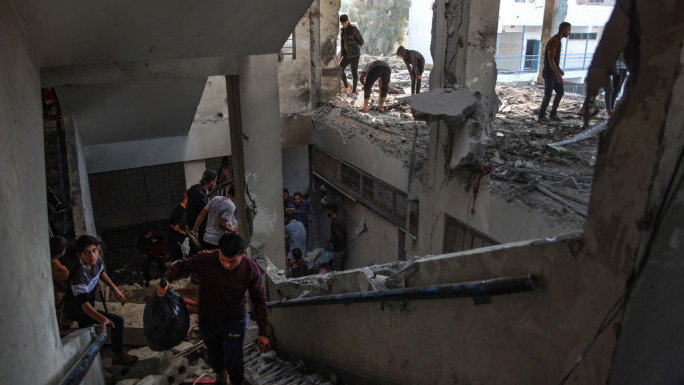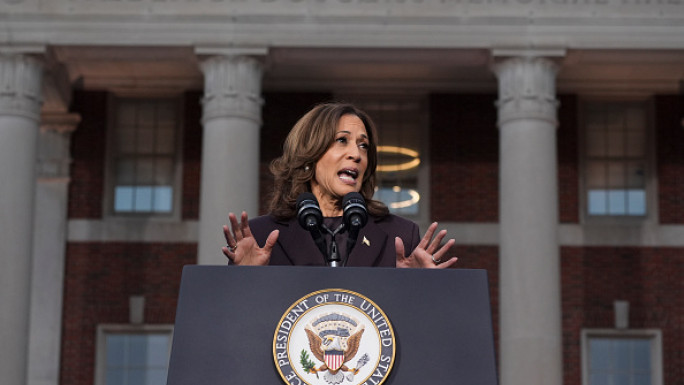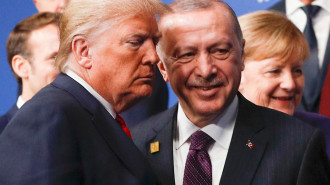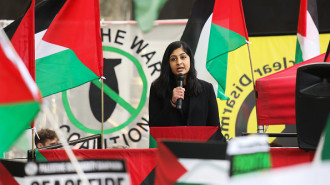Abu Mahdi al-Muhandis: Iran's man leading Iraq's paramilitaries
A shadowy and unflinchingly loyal figure, all bets are off in finding a replacement to lead the Hashd force, as there are few potential candidates with as strong ideological and personal ties to Iran.
Al-Muhandis' impenetrable ties to the Islamic Republic made him a sworn enemy of the United States, who targeted the paramilitary leader along with his personal friend and top commander of Iran's elite Quds force Qasem Soleimani in Friday's strike.
The men both died in a strike on a convoy belonging to the Hashd al-Shaabi, which has close ties to Iran and was officially made part of the Iraqi security forces in July 2019.
Read more: Who was Qasem Soleimani, the powerful commander of Iran's elite Quds force?
The attack - known now to have been a precision drone strike - came just days after Hashd supporters stormed the American embassy in Baghdad, provoking anger in Washington.
Muhandis - a nom-de-guerre for Jamal Jaafar al-Ibrahimi - was himself among the pro-Iran rioters laying siege to the embassy on Tuesday.
Twitter Post
|
Muhandis 'demonstrative of Iran proxies in Iraq'
Known for his virulent anti-Americanism during the US-led occupation in Iraq, Muhandis spent decades building close ties to Iran.
"Muhandis was demonstrative of how Iran built its network of proxies in Iraq," said Phillip Smyth, a US-based researcher focused on Shia armed groups.
"He has history with basically every major network Iran had in Iraq. You would not have found a stronger ideal" of Iran's influence in the country, he said.
Born in 1953 in Iraq's southern Basra, Muhandis held both Iraqi and Iranian citizenship and speaks fluent Persian as well as Arabic.
In the 1980s, he was a leading commander in the Badr Corps, a unit of Iraqi fighters founded in Iran in opposition to then-dictator Saddam Hussein.
The political arm of the Badr Corps was later integrated into the Iraqi state after the group took control of the interior and transport ministries, giving the Islamic Republic further inroads into Baghdad's politics.
Muhandis was sentenced to death in Kuwait for involvement in the 1983 bomb attacks on US and French embassies there, but managed to flee the country.
'Inveterate opponent of US'
After Saddam's ouster in the US-led invasion in 2003, Muhandis briefly served as a member of parliament in Iraq following the 2005 elections.
Twitter Post
|
He then helped found Kataeb Hezbollah - a hardline Iran-backed faction that targeted US troops during the invasion - and both Muhandis and Kataeb Hezbollah were sanctioned by the US in 2009 as "terrorist" entities.
Washington accused Muhandis of smuggling weapons, assissting in bombings of Western embassies and attempted assassinations in the region.
Michael Knights, an expert at the Washington Institute, described Muhandis as "the most inveterate opponent of the United States" among Iraq's Shia armed groups.
He was later appointed deputy head of the Hashd, founded as a loose network of Shia-majority factions fighting the Islamic State group in Iraq.
Although it was later absorbed into Iraq's formal security forces, some of its more hardline factions, including Kataeb Hezbollah, still operate independently of Baghdad.
"Muhandis worked assiduously to develop the Hashed into an organization that was neither subject to full prime ministerial command nor subordinate to the conventional security forces," said Knights.
Although he worked under Faleh al-Fayyadh, also Iraq's national security adviser, Muhandis was widely recognised as the Hashd's "real" leader, observers said.
He had both the utmost loyalty of its forces on the ground and control over its financial resources.
That made him "the central nervous system" of the IRGC's Quds Force in Iraq, Knights wrote last year.
Comment: US attack on Iraqi militia further entrenches US military in Middle East
He was a personal advisor to Soleimani, with the two pictured on multiple occasions in warm embraces.
Like the Iranian commander, Muhandis sported a white beard and kept his white hair swept into a neat coiffe.
Despite his high-profile position within the Hashd, Muhandis rarely appeared in public or delved into politics, apart from making a rare public accusation last year, blaming the US and Israel for a string of mysterious blasts on Hashd bases.
Agencies contributed to this report.


![President Pezeshkian has denounced Israel's attacks on Lebanon [Getty]](/sites/default/files/styles/image_684x385/public/2173482924.jpeg?h=a5f2f23a&itok=q3evVtko)



 Follow the Middle East's top stories in English at The New Arab on Google News
Follow the Middle East's top stories in English at The New Arab on Google News


